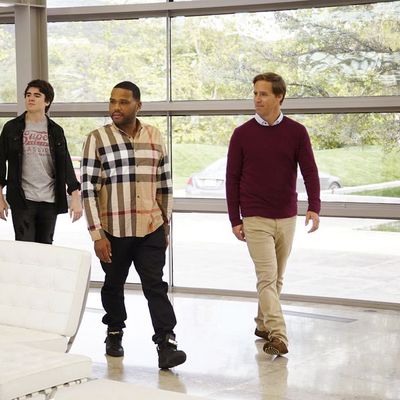
Charlie’s back and nothing else matters! Except wealth and Dre’s constant insecurity about status. To be fair, when a person isn’t raised with financial security, it’s a frequent worry despite their income bracket. Nevertheless, Dre’s concern that money makes the man is too familiar a frustration. Black-ish needs to mix it up.
Dre begins “Wealthy Lives Matter” by lamenting the fact that Junior is so unlike him. He thinks sons are supposed to continue the legacy of their fathers. Junior is unlike anyone else, and instead of Dre appreciating his son’s uniqueness, it’s a source of aggravation. Until, that is, Dre sees Junior hanging out with his friends, Wes and Kevin. These two boys have pristine, trendy tennis shoes and it’s like Cupid shot an arrow right into Dre’s heart. When Junior asks for a pair of new Jordans, Dre is overwhelmed and cries right there on the spot.
Dre’s pride in Junior’s new friendships is short-lived. Wes’s family is hosting a fundraiser for President Obama, which makes Dre wonder exactly how well off they are. Wes reveals he has a house in Brentwood, a wealthy Los Angeles suburb, but he’s not sure how many houses his parents have because it would be gauche to ask. (Nice little dig at Dre’s nosiness, kid.) Of course, Dre begins to spiral from there, wondering how a teenager could have that kind of wealth and how his family compares.
Dre turns to his colleagues for support — and thank goodness Charlie is back. He gives a surprisingly thorough definition of the word “gauche,” complete with using it in a sentence to complain about Dre not making eye contact with him at the urinals. Dre doesn’t want Junior to lose touch with reality by associating with rich brats. Mr. Stevens is a prime example of this — the guy thinks a loaf of bread costs over $100. It’s so great to have Charlie back just for his silent, shocked reaction to Mr. Stevens’s claim that wealthy lives matter. Josh is there to punctuate the discussion, too, but everyone pales next to Charlie, who thinks the wealthy keep minorities as pets, just like in Richard Pryor’s The Toy. With only two episodes left in the season, it’ll be almost unbearable to wait for Charlie and Diane’s next confrontation.
Dre’s anxiety about Junior losing his identity to wealth is nothing new. In fact, it’s baked into the show’s premise: How can a man from humble roots keep his family grounded while giving them the best he can provide? There’s nothing wrong with reminding the audience what’s at the core of Black-ish, but this story line falls flat, particularly when Dre reveals he doesn’t want Junior to be embarrassed by the Johnsons’ relatively modest financial status. Dre’s not so concerned about Junior having unrealistic expectations; he’s worried that Junior will find him lacking as a breadwinner. It all comes back to Dre’s ego and his fear of not providing enough. Junior eventually assures Dre that he is enough, which soothes his father’s sensitive pride.
Maybe I would have felt invested in Dre’s freak-out if there had been some mention of the layoffs at work. It’s not clear if that situation is over, but that would help solidify Dre’s fears about not stacking up against the wealthy families of Junior’s friends. Black-ish spends so much time repairing Dre’s sensitive ego and manhood. It’s frustrating, and frankly annoying, that a grown man like Dre needs to be reassured that he’s meeting a self-imposed definition of manhood.
During all of this, Vivian has finally returned. (Welcome back, Regina Hall!) Someone keeps breaking things around the house, but no one ever fesses up. Vivian thinks Bow should be stricter about making the kids and Ruby confess. She also assures Bow she’s not being judgmental when she grunts about the unclaimed messes — she just has poor “hmph” control. And so, Bow punishes Zoey, the twins, and Ruby until they offer up a sacrificial lamb: Jack. Despite his hurt ankle, Jack must take out trash bags of fish guts as punishment, but he’s so pitiful that Zoey and Diane (with some prompting) feel bad enough that they take the trash out. In an homage to Usual Suspects, Jack’s hurt ankle disappears as he does a victory dance, and Bow reveals to Vivian that she knew all along that Jack was the culprit.
This lukewarm B-story mostly serves as a way to reintroduce Vivian. (In a recent New Yorker profile of Black-ish creator Kenya Barris, Barris describes a debate in the writers’ room about the Johnsons hiring a nanny — does it make them seem too privileged?) At one point when Vivian walks by, Ruby even asks, “Who is that?” We haven’t seen Vivian in three episodes, but the character mentions she’s been working for the Johnsons for a few months. Is the show trying to establish her place within the household? This subplot doesn’t really add much to the episode.
Although Black-ish is largely about creating new family traditions based on a past that’s remarkably different than the present, it all too often focuses on Dre’s frustrating ideas about masculinity. He frequently worries if he’s good enough as a man, as a husband, and as a father. His children prove themselves to be talented and intelligent again and again, yet Dre still worries. Bow shows how much she loves him again and again, yet Dre still worries. Sure, it’s kind of admirable that he wants to be the best version of himself for his family. But how many different ways does he need to be validated? Ultimately, Dre’s worries about his family’s welfare boil down to how he appears to other people. Let’s hope the third season pushes him to get over his ego. I wouldn’t count on it.

